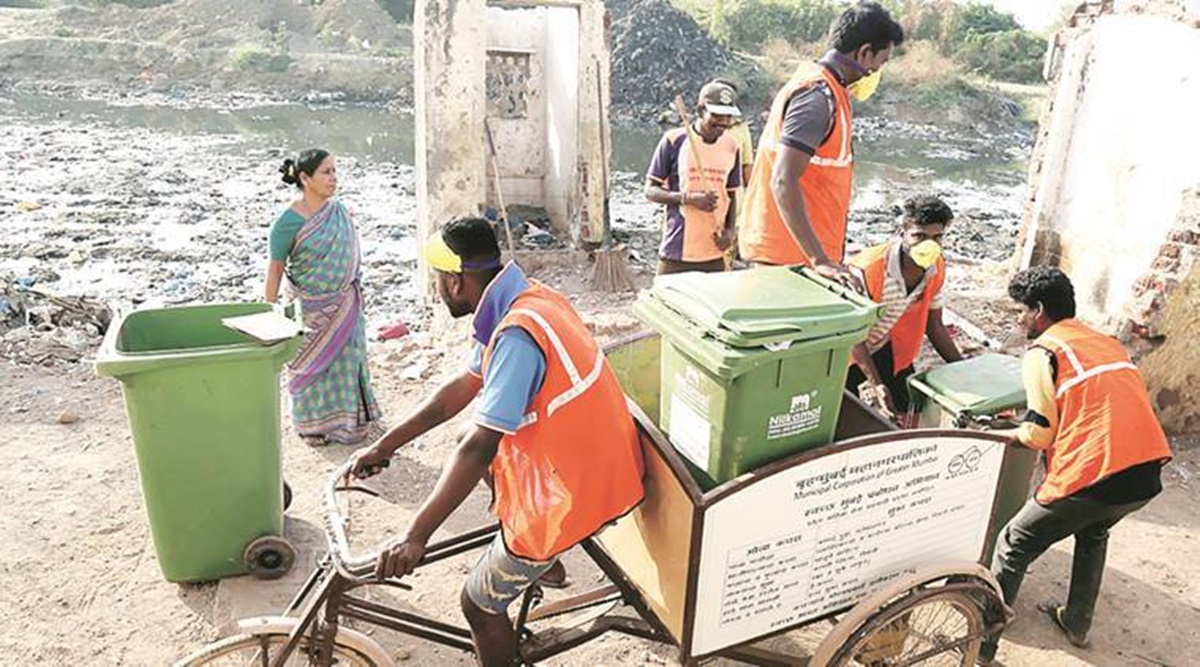 Pimpri-Chinchwad Municipal Corporation (PCMC) has announced that it will not collect wet garbage from 'big' housing societies from October 2. (Representational/file pic)
Pimpri-Chinchwad Municipal Corporation (PCMC) has announced that it will not collect wet garbage from 'big' housing societies from October 2. (Representational/file pic)Residential housing societies in Pimpri-Chinchwad have opposed the civic body’s decision to discontinue collection of wet garbage from October 2. The societies alleged that several projects received ‘completion certificates’ from the Pimpri-Chinchwad Municipal Corporation (PCMC) without the builders having installed wet waste processing plants as mandated by Solid Waste Management Rules, 2016.
“On one hand, the PCMC is telling us to look after our wet waste by setting up our own wet waste processing plants but, on the other hand, the PCMC is not verifying whether the builders have set up wet waste processing plants in the residential housing societies,” said Sanjeev Sangale, the head of Chikhli-Moshi-Pimpri-Chinchwad Housing Society Federation.
Sangale further said, “There are 738 housing societies under our federation. Of these, 238 societies are smaller societies, meaning they do not generate 100 kg wet waste daily. Of the remaining 500, only five housing societies have wet waste processing plants. This clearly means that the PCMC has issued completion certificates to these builders despite the fact that they have not followed the norms… of setting up wet waste processing plants.
“If the PCMC is warning us of taking action if we do not process our wet waste, likewise they should also take action against builders who have failed to set up wet waste processing plants in their own projects and violated the laid-down norms.”
Demanding action against ‘guilty’ PCMC officials, Sangale said their federation would send a letter to both Chief Minister Eknath Shinde and municipal commissioner Shekhar Singh seeking a probe against officials who gave completion certificates despite builders not setting up wet waste processing plants. “We want a probe into this violation of norms,” he said.
Sangale said they had also sought action against ‘guilty’ builders during the tenure of former municipal commissioner Shravan Hardikar three years ago. “The then civic chief had promised action in seven days. However, till date we have not heard what action has been taken against such guilty builders,” he said.
Sangale added that though they are seeking a probe, they also want a solution to the wet waste collection issue. “We have discussed the problem with PCMC officials. Members of housing societies are also discussing the issue among themselves… The PCMC should not shirk its responsibility. It should take the initiative and set up wet waste processing plants to cater to a group of societies and not put the burden on the societies,” he said.
PCMC deputy municipal commissioner Ajay Charthankar said, “The rules regarding setting up wet waste processing plants came into effect from 2016. The Union Government had framed Solid Waste Management Rules, 2016, which are applicable across the country. They are mandatory for all cities. There is no question of accepting or rejecting them. The state government has also incorporated the Solid Waste Management Rules, 2016, into the Urban Development Control Regulations (UDCR). The UDCR makes it mandatory for builders to set up wet waste processing plants before they are given completion certificates…”
Charthankar said it was, therefore, mandatory for builders to set up wet waste processing plants in their projects after 2016. “However, it is also true that builders seem to have secured completion certificates after temporarily assembling the machinery of wet waste processing plants and then taking away the machinery. The municipal commissioner will look into this aspect,” he added.
Charthankar said residential societies that generate 100 kg wet waste daily will have to either set up their own system or hand over the wet waste to private parties for converting it into compost. “The Union Government norm is that every family generates 2.5 kg waste per day. Of these, 1.5 kg waste is wet waste. If a residential society has 75 flats, it is categorised as a bulk wet waste generator. Such societies have to set up their own system to process the wet waste. They cannot rely on the PCMC to do the job,” he added.